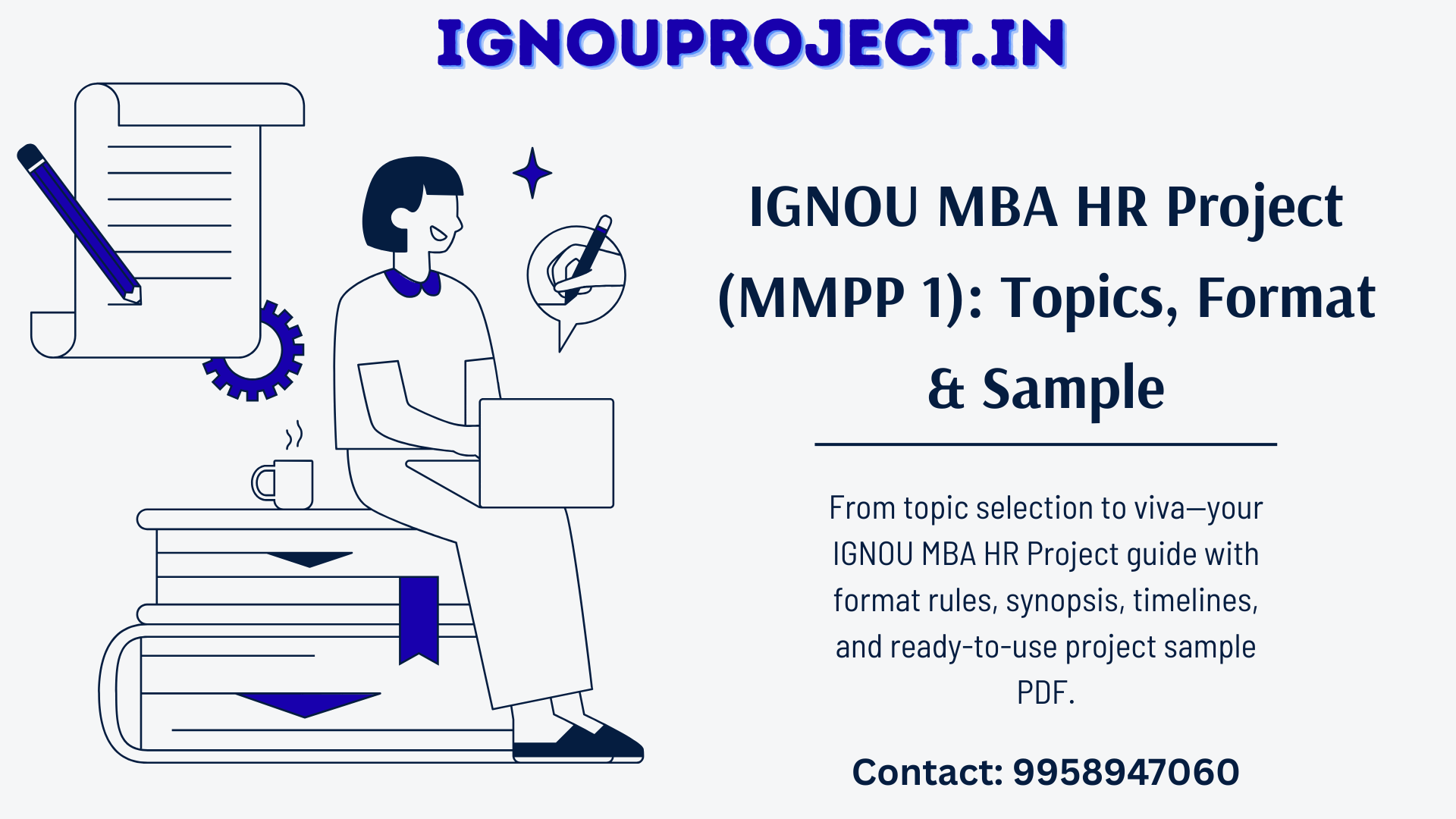The IGNOU MBA HR Project (MMPP 1) is a mandatory 8-credit capstone course in Semester 3. Students select an HR-related topic, write an approved project synopsis, and conduct original research or analysis. The goal is to apply HR concepts and analytical tools to real workplace issues in areas such as recruitment, training, performance management, compensation, industrial relations or HR analytics. A successful project culminates in a final report of about 50–60 double-spaced pages (~18,000 words) and may include a viva-voce.
Key Highlights & Quick Summary:
- 8-credit final MBA project (MMPP-001) focusing on HR specialization
- Project report (~18,000 words) with title page, certificate, declaration, abstract, chapters, references, annexures
- Topic selection across HR domains (Recruitment, T&D, Performance Management, etc.) aligned with data availability
- Prepare an approved synopsis (introduction, objectives, methodology) before data collection
- Data analysis using primary/secondary data, with tools like SPSS/Excel and statistical tests (t-test, ANOVA)
- Follow IGNOU Project Guidelines to avoid plagiarism; include ethics and consent for HR surveys
- Submit the bound report (hardcopy or online) with required enclosures; attend viva if called
Table of contents
What Is the IGNOU MBA HR Project?
The IGNOU MBA HR Project (course code MMPP-001) is a compulsory component of the MBA program (Semester 3). It is an 8-credit project course (equivalent to two courses) where students research an HR topic of their choice. The goal is to apply multidisciplinary HR concepts and tools to solve real organisational problems. Students first submit a synopsis for approval, then carry out the study and submit a final project report (around 50–60 double-spaced pages, ~18,000 words) (50–60 double-spaced pages, ~18,000 words) and may include a viva-voce.
Credit Weightage & Evaluation Overview
The MMPP-001 project carries 8 credits (treated as one course). Unlike regular courses, its entire assessment is based on the project report (usually 100% of marks) and any viva-voce. Evaluators review the report for depth of analysis and originality. If the examiner recommends, a student may be asked to appear for an oral viva-voce examination to defend the work.
HR Specialization Scope
Students should choose a project topic within the HR specialization area. Common HR domains include:
- Recruitment & Selection (e.g. talent acquisition strategies, employer branding)
- Training & Development (e.g. impact of training programs, skill-gap analysis)
- Performance Management (e.g. appraisal systems, KPI measurement)
- Compensation & Benefits (e.g. salary structure, reward systems)
- Industrial and Employee Relations (e.g. grievance handling, labor law compliance)
- HR Analytics/HRIS (e.g. predictive analytics for turnover, HRIS implementation)
Projects should address a clear issue in one of these areas (for example, evaluating campus recruiting effectiveness, measuring training ROI, or using analytics to predict attrition). Choose a topic that leverages your specialization and interests, while remaining practical and relevant.
IGNOU MBA HR Project Format
Mandatory Structure
An IGNOU MBA project report for HR stream must follow the prescribed format. Key components include:
- Title Page: Project title, student’s name, enrolment number, programme code (MBA), study centre, and year of submission.
- Project Approval & Certificates: Insert the approved Project Proposal Proforma (synopsis approval). Include a Certificate of Originality signed by the student and guide, and a supervisor’s certificate confirming genuine work. A Declaration by the student may also be required.
- Abstract/Executive Summary: A brief summary (1–2 pages) of objectives, methodology, key findings and recommendations.
- Acknowledgements (optional): Expression of gratitude to guide or contributors.
- Table of Contents: List of chapters, sections and page numbers (and List of Figures/Tables if any).
- Chapter Contents: Structured chapters typically include:
- Introduction: Background, problem statement, objectives, scope and significance of the study.
- Literature Review: Summary of existing research or industry practices relevant to the topic.
- Research Methodology: Approach, research design, data sources, sample and sampling, data collection methods, and analytical tools.
- Data Analysis & Findings: Presentation and interpretation of research results (with tables, charts, figures).
- Conclusion & Recommendations: Summarize findings, answer research questions, and suggest improvements or future work.
- References: List of all cited books, articles, websites and other sources in a consistent academic style (e.g. APA, Harvard).
- Annexures/Appendices: Supplementary material such as the survey questionnaire, interview transcripts, consent forms, raw data or additional tables.
Referencing & Plagiarism
All sources and data must be properly cited. Use a standard academic reference style (e.g., APA or Harvard) and list references at the end. Ignoring citation or copying others’ text without attribution is strictly prohibited. The work should be original: direct quotations must be in quotes with citations. An originality certificate (signed by you and your guide) must accompany the report to affirm authenticity. Always paraphrase in your own words when summarizing others’ ideas to avoid plagiarism.
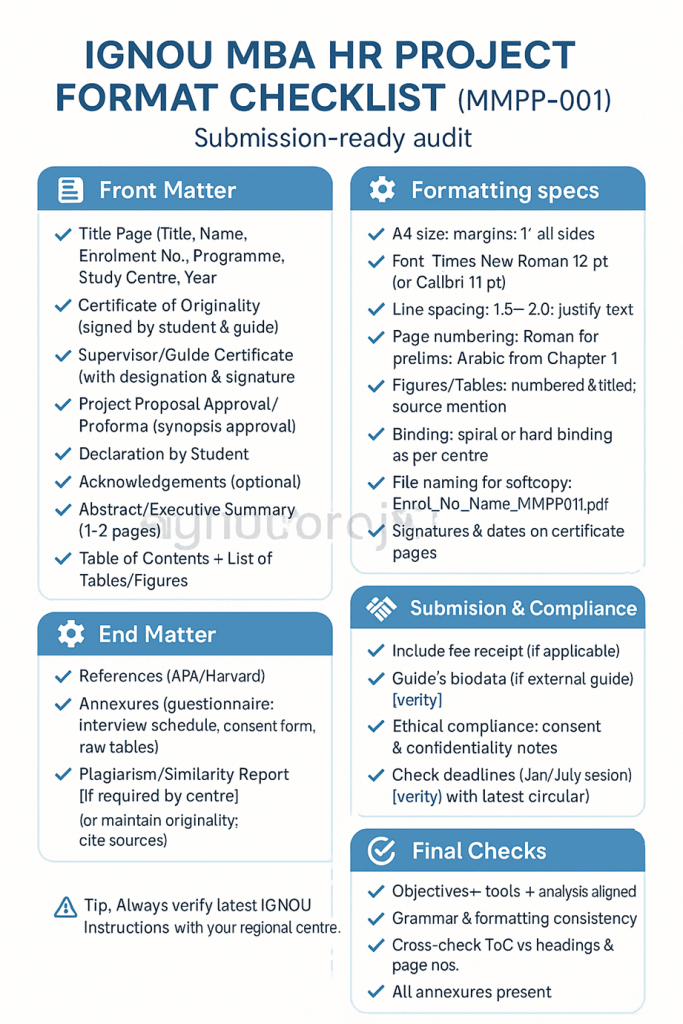
Figure: IGNOU MBA HR Project Format Checklist
IGNOU MBA HR Project Topic Selection
Align with Problem Statement & Data Availability
Choose a project topic that clearly defines an HR management problem or question in your specialization. The title should be concise yet definitive, indicating the core issue. Ensure that data can be realistically obtained: confirm access to organizations or respondents if planning primary research, or the availability of reliable secondary data if needed. For example, if studying training effectiveness, ensure a company will allow survey access or has performance data to share. The topic should also align with your educational objectives and resource constraints.
Primary vs Secondary Data Feasibility in HR
Decide whether to use primary data, secondary data, or both. Primary data (e.g., surveys, interviews, questionnaires) provides first-hand insights but requires ethical consent and sufficient sample size. Secondary data (company records, industry reports, academic studies) is easier to gather but may limit originality. A mixed approach often works best. For instance, you might conduct an employee survey for original feedback and also analyze relevant industry benchmark data. Ensure whichever data you use is current and relevant to your objectives.
30+ IGNOU MBA HR Project Topics (Curated)
Recruitment & Selection
- Study of recruitment and selection process in [organization/industry]
- Role of employer branding on talent acquisition
- Impact of social media recruiting on candidate quality
- Campus recruitment vs experienced hiring in IT sector
- Diversity hiring practices and outcomes
- Assessing candidate experience during the recruitment process
Training & Development
- Effectiveness of training programs on employee performance
- Impact of e-learning modules on employee skill improvement
- Training need analysis in [sector]
- Role of mentorship programs in employee career growth
- Assessment of onboarding and induction training effectiveness
- Linking training interventions to skill-gap reduction
Performance Management
- Impact of performance appraisal on employee motivation
- Effectiveness of 360-degree feedback systems
- Linking KPIs to employee productivity in [company]
- Role of goal-setting in performance management
- Study of performance improvement plans in organizations
- Study of performance-based rewards on employee productivity
Compensation & Benefits
- Influence of compensation and benefits on employee retention
- Perception of fairness in salary structures
- Role of incentives in sales force performance
- Impact of health and wellness programs on workforce productivity
- Employee stock ownership plans and commitment
- Comparative analysis of perks in IT vs manufacturing sectors
Industrial Relations/Compliance
- Employee grievance handling and satisfaction levels
- Implementation of labor laws in [sector]
- Work-life balance policies and union negotiations
- Effect of disciplinary policies on employee morale
- Study of employee welfare measures in manufacturing industry
- Role of labor unions in shaping workplace policies
HR Analytics/HRIS
- Predictive analytics for employee turnover
- Effectiveness of HRIS implementation in organizations
- Use of data mining in recruitment decisions
- Sentiment analysis of employee feedback
- HR dashboard development using Excel/SPSS
- Developing predictive models for identifying training needs
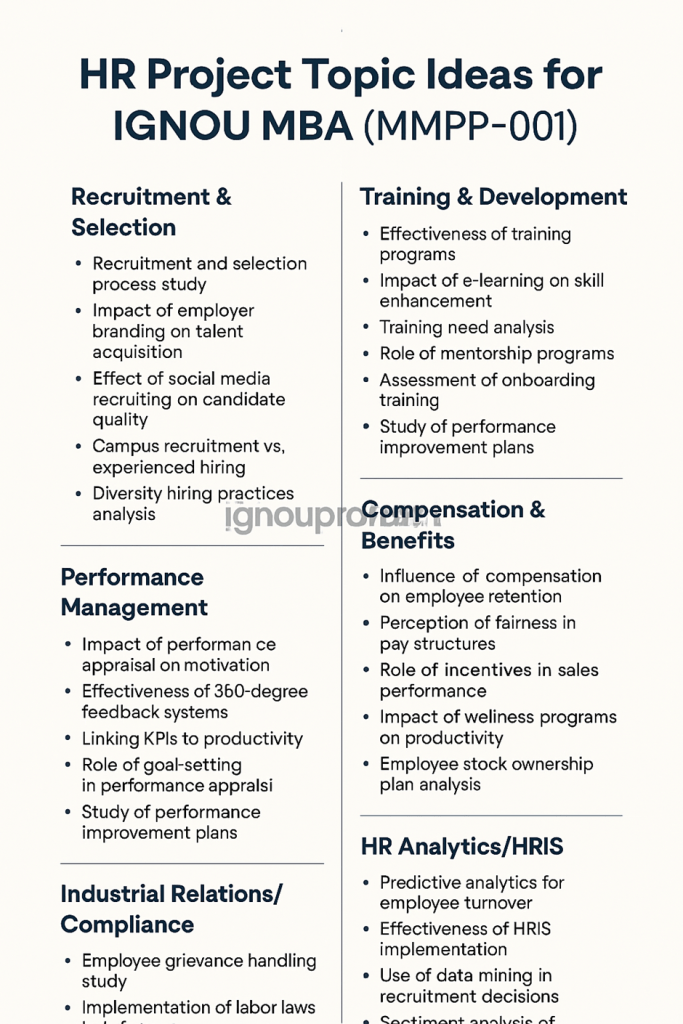
Figure: HR Project Topic Ideas for IGNOU MBA
IGNOU MBA HR Project Synopsis Writing
Key Elements of the Synopsis
The MBA HR synopsis (project proposal) should concisely outline your study plan. Include:
- Problem Statement/Introduction: Brief background of the chosen topic and rationale for the study.
- Objectives: Clear, numbered research objectives/goals (stated in neutral, measurable terms).
- Scope of Study: Define the boundaries (e.g., specific organization, departments, time frame).
- Research Methodology: Describe research design (case study, survey, etc.), data sources (primary/secondary), sampling (size and method) and data collection methods (questionnaire, interview).
- Tools and Analysis: Mention instruments (e.g. structured questionnaire with Likert-scale items) and analysis plan (software like Excel or SPSS, planned statistical tests).
- Limitations: Any known constraints or assumptions.
Learn how to make an IGNOU Synopsis
Sample Timeline & Approval Checklist
A sample timeline for a 3–4-month project might be:
- Week 1-2: Finalize topic and select a guide.
- Week 3-4: Conduct literature review and prepare draft synopsis.
- Week 5: Submit synopsis (with the filled Project Approval Proforma) for approval.
- Week 6-8: Collect data (distribute questionnaires, conduct interviews).
- Week 9-10: Analyze data (using Excel/SPSS, perform tests).
- Week 11-12: Write final report chapters, prepare tables/charts.
- Week 13: Print, bind, and submit the project report.
Before submitting the final report, ensure the following documents are ready and approved:
- Project Approval Proforma (Synposis): Duly filled and signed by you and your guide with dates.
- Guide’s Bio-data: If the guide is not an IGNOU faculty.
- Originality Certificate: Signed by student and guide confirming original work.
- Project Fee Receipt: Proof of payment of the evaluation fee.
Research Methodology (MBA HR-Specific)
Sampling, Likert Scales, and Reliability
Specify your sampling method (random, stratified, purposive, etc.) and justify the sample size (e.g., a minimum of 30–50 respondents for simple quantitative analysis). In HR surveys, Likert scales (typically 5-point) are commonly used for measuring attitudes and perceptions. If multiple items measure the same construct (e.g., job satisfaction), calculate Cronbach’s alpha to assess reliability (a value around 0.7 or above is generally acceptable). Ensure your data collection instruments (questionnaire, interview schedule) are clear and pilot-tested.
Tools & Analysis: Excel/SPSS, Statistical Tests, Ethics & Consent
Explain the software/tools for data analysis: Excel can handle basic calculations and charts; SPSS (or equivalents) supports advanced statistical tests. State which tests you will apply (for example, t-test to compare means between two groups, ANOVA for more than two groups, Chi-square for categorical variables, or regression/correlation analysis for relationships). Describe how you will interpret key metrics (e.g. mean, standard deviation, p-values). Always follow ethical research norms: obtain informed consent and explain confidentiality to participants, allow them to withdraw at any time, and include a consent form if needed.
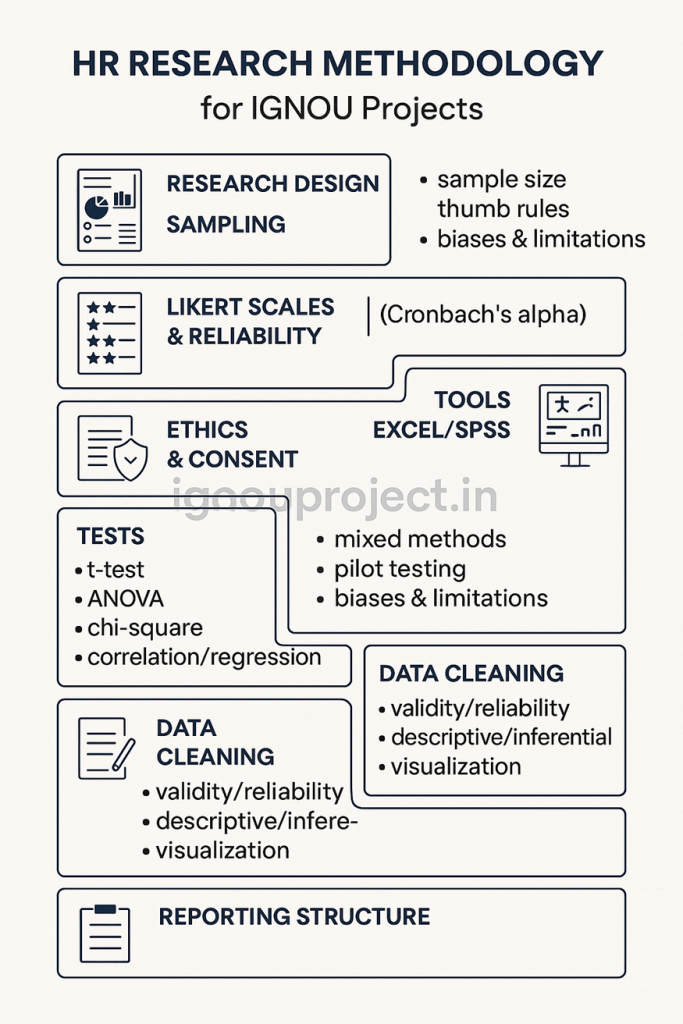
Figure: HR Research Methodology for IGNOU Projects
IGNOU MBA HR Project Submission & Timelines
Printing, Binding, Annexures & Signatures
When printing the final report, use A4 paper, double spacing and a clear readable font. Number all pages sequentially. The report must be properly bound (spiral or hard binding); do not submit a stapled copy. Insert the approved project proposal, Originality Certificate and guide’s biodata (if applicable) before binding. Attach annexures at the end: include the survey questionnaire, interview transcripts, consent forms, and any supplementary data. Ensure all certificates and declaration pages are signed.
Common Rejection Reasons & Fixes
IGNOU may reject your HR project for several reasons. Common issues include:
- Synopsis Issues: Unclear objectives or weak rationale.
- Format Errors: Missing sections (no abstract, missing references), incorrect spacing or formatting.
- Missing Documents: Forgetting to attach the signed synopsis approval form, guide bio-data, or originality certificate.
- Plagiarism: Copying text without citation.
- Methodology Errors: Very small sample size, improper data analysis, or conclusions not supported by data.
To avoid rejection, strictly follow the IGNOU project format and checklist, proofread carefully, ensure originality, and attach all required documents (approval form, fee receipt, etc.) clearly.
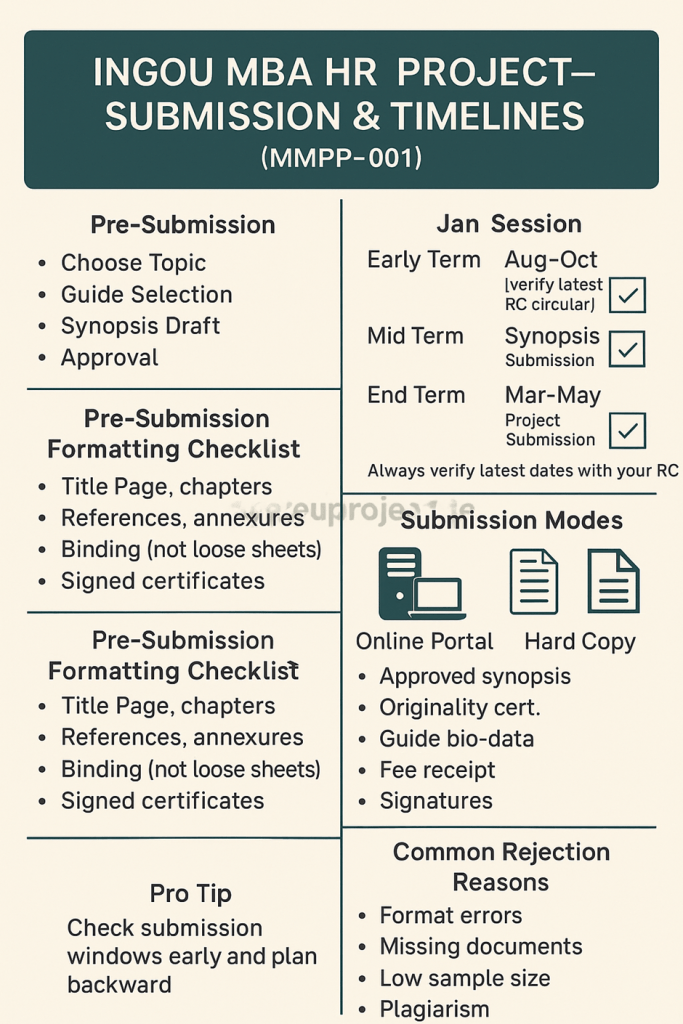
Figure: Project Submission & Timelines in IGNOU MBA HR
Viva-Voce Questions in MBA HR Project
10 Common Viva Questions
- Why did you choose this topic for your project?
- What are the main objectives of your study?
- What research methodology and tools did you use, and why?
- How did you select your sample and calculate its size?
- Can you explain any statistical tests you applied (e.g., t-test, ANOVA)?
- Summarize your key findings and recommendations.
- How does your project contribute to HR knowledge or practice?
- What challenges or limitations did you encounter in your research?
- Why did you use a Likert scale, and what does Cronbach’s alpha indicate in your data?
- Did you obtain consent from participants, and how did you ensure ethical compliance?
Downloadable Resources
- IGNOU MBA HR Project Guidelines / Handbook
- IGNOU MBA HR Project Synopsis Sample PDF
- MMPP 1 Project Sample PDF in MBA HR
- IGNOU MBA HR MMPP 1 Project Topic List
FAQs – IGNOU MBA HR Project for MMPP 1
Q: What is the format for IGNOU MBA HR Project (MMPP-001)?
A: Follow IGNOU’s format: title page, approval proforma, declaration, abstract, chapters (introduction, review, methodology, etc.), references and annexures. The report is typically 50–60 pages (≈18,000 words) double-spaced.
Q: How to choose HR project topics for IGNOU MBA?
A: Pick a clear, practical HR issue in your specialization. Ensure data availability and relevance. Align with course objectives and your interests. Examples include talent acquisition strategies, training impact, performance appraisal analysis, or HR analytics applications.
Q: What is the word limit and structure for IGNOU MBA HR project?
A: The recommended report length is about 18,000 words (50–60 pages) excluding appendices. Structure must include all required sections (title page, certificates, abstract, chapters, references, annexures). Double-spacing and proper formatting are expected.
Q: How to write an IGNOU MBA HR project synopsis?
A: Draft a concise proposal: introduce the topic and rationale, state clear objectives and scope, outline your research design (data sources, sampling) and analysis tools. Include a timeline. Submit this synopsis in the prescribed format to your guide/centre for approval.
Q: Do I need primary data for an HR project at IGNOU?
A: Primary data is recommended (e.g., surveys, interviews) as it strengthens originality. However, credible secondary data (reports, company records) can supplement it. If relying on secondary data, ensure your analysis and interpretation are original and properly cited.
Q: How to submit IGNOU MBA HR project and avoid rejection?
A: Submit the bound report to the Registrar (or via the online portal) by the deadline. Include the signed approval form, originality certificate, fee receipt and guide’s bio-data. Avoid common errors: follow the format precisely, cite all sources, and double-check that every required document is attached.
Q: What are common viva questions for an IGNOU MBA HR project?
A: Expect questions on your topic choice, objectives, methodology, sample, key findings, and implications. Examples: Why this topic? What methods did you use? What are your findings? How is Cronbach’s alpha relevant? Were ethical considerations observed?
Q: What HR analytics topics are suitable for IGNOU MBA project?
A: Analytics topics involve data-driven HR issues, such as predicting employee turnover using statistical models, evaluating the impact of HRIS on decision-making, analyzing training data for ROI, or building dashboards for HR metrics.
Conclusion
The IGNOU MBA HR project is a critical component that demonstrates your ability to apply HR theory to practice. Follow official guidelines on format, analysis and submission, and maintain academic integrity. With careful planning and adherence to requirements, you can complete a strong project and excel in the evaluation. Best wishes for your project success!
👉 To learn more about project writing in MBA, check out our blogs:
Need Help in IGNOU MBA HR Project (MMPP 1)?
Use this guide to plan and write your IGNOU MBA HR project systematically. Begin early, follow the prescribed format and ethical standards, and seek guidance from your project guide or IGNOU resources if needed.
Get expert assistance, topic suggestions, and ready-to-submit project reports now!
👉 [Contact Us] | 🌐 Visit: ignouproject.in

